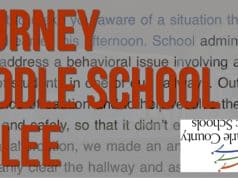An angry, race-charged mob shut down Charlottesville’s December 15 City Council meeting.
The trouble commenced during “matters by the public,” where citizens have three minutes to address the council. When John Heyden, an older, white Charlottesville resident began to speak on the topic of factual racial dialogue, moans, whoops, hollers, chants, and cries of “racist” filled the council chambers.
Reading from prepared remarks, Heyden repeatedly was interrupted by the mob so that his allotted time was severely curtailed. Mayor Satyendra Huja, meekly sought silence from the crowd on occasion, but his impotent requests were ignored by an increasingly agitated horde.
As Heyden’s three minutes expired, Councilor Kristin Szakos urged to Mayor to suspend the speaker, noting that his time was up. Huja complied and ordered Mr. Heyden to stop—this despite the fact that Charlottesville City Council speakers routinely exceed their time without reprimand.
Instead, the speaker insisted that he would not leave the dais until he was permitted to finish. Encouraged by Szakos’ support, the crowd descended into preturbation. Mayor Huja, Szakos, and Clerk of Council Paige Rice concurrently hailed the police officer on duty to remove Heyden. Gently, Officer Harvey Finkle escorted a visibly shaken John Heyden back to his seat.
Mr. Heyden, whose natural rights were profoundly abridged, is contemplating legal action.
Councilor Szakos, a community organizer with close ties to Barack Obama, characterized the crowd’s angry, petulant outbursts as, “probably stuff we needed to hear.” She made no reference to the trespass on Mr. Heyden’s rights.
Mayor Satyendra Huja is no stranger to speech discrimination. Here, he not only violated Mr. Heyden through his prostrate administration of the meeting, but he discriminatorily ignored the adopted rules of City Council, which prohibit intimidation, interruption of other speakers, or disruptive behavior. Under such circumstances, the Mayor is bound to the following policy:
Any speaker who violates these Rules for Public Participation will be called to order by the presiding officer. If the remarks or conduct persists the presiding officer shall order the speaker to cease speaking and to be seated. If that order is not heeded the presiding officer shall direct the Sergeant-at-Arms to escort the individual from the meeting room.
The presiding officer may also order the expulsion of any person for a serious violation of these rules, disruptive behavior, or any words or action which incites violence or disorder, subject to appeal to City Council. Any person so expelled shall not be readmitted for the remainder of the meeting from which expelled. [emphasis added]
Several points of inquiry sent to Charlottesville Spokesperson, Miriam Dickler, were not answered. She deferred questions to the Mayor and councilors, none of whom have replied. The Charlottesville Police Department puts responsibility for calling to maintain order squarely on the shoulders of Mayor Huja.
Local media has been largely silent on the event and its dire implications for free speech in Charlottesville.
A spineless mayor, a volatile crowd, duplicitous councilors, and potentially inflammatory topics are a pernicious combination. While mobocracy, mayhem, and Mayor Huja march hand-in-hand down the road to progressive perdition, somewhere, on a little mountain not far from Charlottesville, a founder’s spirit weeps.









Libertarian definition of racism= A form of collectivism in which decisions are based on race.
Progressive definition of racism= oppression of one race by a race with higher amount of social power.
Libertarian definition is equivalent in all directions of use (bilateral, etc), and objectively ascertained.
Progressive definition is unidirectional, against one of the many groups that has historically been oppressed based on skin color.
Libertarian definition recognizes racism to be a form of collective mentality within an individual–an individual who is racist is ill with the collectivist infection.
Progressive definition is entirely collectivist, focused on groups, encourages thinking about groups instead of individuals, without concern of individual differences. Progressive definition lumps the billionaires of one race who attend the country club, with the homeless of that same race, purely based on race. The Liberian sick with Ebola in Dallas drew Jesse Jackson's attention solely because he was black–not African American, but black. Jesse Jackson's choices fit the libertarian definition of racism.
Libertarians examine the content of the individual's character, and don't pay any heed, one way or the other, to skin color. Libertarians commonly don't check off a box on forms that ask for race, because to a libertarian, race matters not at all. To be clear, a family history of being descended from slaves matters to a libertarian, for such an individual may have adverse consequences echoing down through the decades because of the severity of the crime against their ancestors. But being black is of no consequence to a libertarian. Libertarians despise all situations in which liberty is taken away from any innocent person.
Libertarian focus on the individual is 100% the opposite of the racist focus on groups.
Progressive philosophy is collectivist–entirely focused on groups.
Without the collectivist philosophy, there would be no racism, by definition.
The question is, do we want race to not matter, and have a future where people are judged by the content of their character and not the color of their skin? If so, then the progressive definition of racism needs to be expunged and replaced with the libertarian definition.
If we can work to flush collectivism (groupthink, groupism, racism, fascism, socialism, communism, corporatism, cronyism) down the toilet throughout every level of the culture, then racism–one of the many forms of the evil disease of collectivism– will finally disappear. But this is a challenge, because there are lots of politicians who like to divide the people so as to make them easier to conquer and control. And dividing people based on such visible differences as skin tone, is a great way for the sociopathic politicians to conquer the people.
This event shown in the video above demonstrates calm demeanor by the presenter and obnoxious loudness by some of the audience. But there appeared to be groupthink collectivism from both the presenter and many members of the audience. The speaker wanted to see statistics presented based on race. Why? Crimes are committed by individual human beings, sometimes deciding to act together. Crimes are not committed by the collective thought of groups of people. The people in audience called him racist. What was that based on? To me, the presenter was collectivist for sure, because he wanted to see race-based data (apparently to counter other race based data). But racist? I did not observe that. Maybe he is, because collectivism (progressive liberals modus operandi) is the necessary precursor for racism. But there are many forms of collectivism that are not racist. There is no racist who is not a collectivist.
Race only matters if we invent reasons to make it matter. Individuals, in contrast, and their individual histories, stories, ideologies, and thinking, do truly matter.
Let's flush collectivism and its spawn, racism, down the toilet forever.
Sent these remarks/requests to City Council and copied to Human Rights Commission.
The public has been shocked to see, and City Council may truly be concerned, regarding an apparent failure to protect the Constitutional rights of Mr Heyden in its chamber, under its authority, at its December 15 2015 meeting.
Viewing a recording of the meeting – http://bearingdrift.com/2014/12/19/mobocracy-and-mayhem-race-charged-mob-kills-charlottesville-free-speech/ – the public observes possible violations of first amendment speech, equal protection, and due process rights. Certainly City Council has an interest that the public know how Council, in its chamber and in any other venue, during its meetings, ensures Constitutional rights of any and all persons.
Observation of the conduct of the December 15 2015 meeting leads the public into uncertainty about Council’s commitment to protect any and all persons’ Constitutional rights. For example, the public observes that no audience members were removed, or threatened with removal by government force, for disrupting the formal process of the meeting; but Mr Heyden – who was participating in the formal process of the meeting – was threatened with removal by government force, and was removed. The public also observes that a person – who may be particularly vulnerable because of age – was being threatened from the audience and yet was not asked by Council about any concerns for accomodation and safety that he might have had.
Please make a report to the public regarding Council’s plan to ensure anyone and everyone speaking in the City’s public meetings has every Constitutional right protected.
Additionally, I share the following direct observations:
I have been in Dialogue on Race meetings that included Mr Heyden. He stayed throughout the meetings and participated respectfully and appropriately in all activities of the meetings. Therefore I have observed that he has made significant and appropriate efforts to hear diverse points of view on issues of race relations, and to share his point of view, within a mutually agreed group process. I have observed that he had come with prepared notes, which is an exercise of self-reflection, and also a measure of respect for an audience to present effectively and efficiently and reasonably. I have been seated beside him in a small group, and I occasionally asked him – as a member of the small group – some questions to help understand his point of view more accurately and deeply.
Without breaching any possible confidentiality I will say that Mr Heyden told a powerful personal story that revealed deeply moral reasoning involving the well being of families and communuities. I was moved emotionally and morally by his personal story as I believe were others in the small group since others in the group, including myself, made supportive statements of caring having heard the story.
I am copying this to the City’s Human Rights Commission for their reflection and action.
Regular ole egalitarians city council.
[…] first instance involved, citizen John Heyden, who dared inquire about the Council’s vote to give more than $250,000 of taxpayer monies to […]
[…] A private property owner in Charlottesville has found himself on the wrong side of the mob. […]